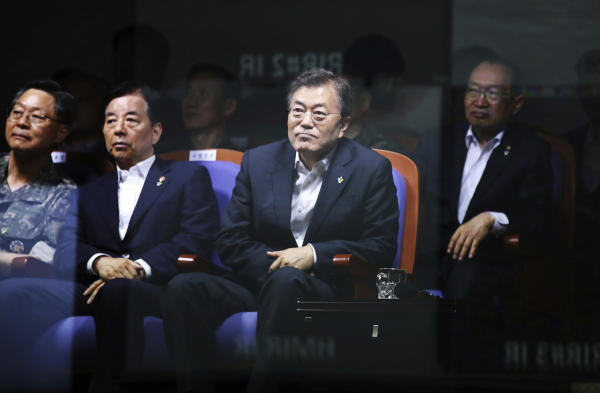South Korean President Moon Jae-in on Friday observed a test-firing of a new mid-range missile a day after a US official announced that Pyongyang carried out another test of a rocket engine that the Washington believes could be part of its program to develop an intercontinental ballistic missile
Seoul is developing its mid-range missile to cope with growing threats from the North.
After the launch at a military test site on the southwest coast, Moon said it was important for South Korea to maintain military capability that could “dominate” North Korea in order to maintain peace on the peninsula and for future engagement policies with the North to be effective, his spokesman Park Soo-hyun said.
Park didn’t say how far the Hyunmoo-2 missile flew or where it landed, but said it accurately hit its target space.
“Our people will feel proud and safe after seeing that our missile capability doesn’t trail North Korea’s,” Park quoted Moon as saying.
He quoted Moon as saying he supported dialogue, however, “dialogue is only possible when we have a strong military and engagement policies are only possible when we have the security capability to dominate North Korea.”
North Korea this year has tested several new missile systems, including a powerful mid-range missile experts say could one day reach targets as far as Hawaii or Alaska. The North also conducted two nuclear tests last year alone as it openly pursues a long-range nuclear missile that could reach the US mainland.
South Korea’s military plans to deploy the Hyunmoo-2, which is designed to hit targets as far as 800 kilometers (497 miles), after conducting two more test firings.
The missile is considered as a key component to the so-called “kill chain” preemptive strike capability the South is pursuing to cope with the North’s growing nuclear and missile threat. Aside of expanding its missile arsenal, South Korea is also strengthening its missile defense systems, which include Patriot-based systems and the Terminal High Altitude Area Defense battery currently under deployment in the southeast county of Seongju.
The United States has tried for years to discourage South Korea from developing longer-range ballistic missiles in keeping with the Missile Technology Control Regime, a voluntary international arms-control pact.
North Korea’s test on Thursday could be for the smallest stage of an intercontinental ballistic missile (ICBM) rocket engine, said the US official, who spoke on the condition of anonymity.
A second US official also confirmed the test but did not provide additional details on the type of rocket component that was being tested or whether it fit into the ICBM program.
North Korea’s state media, which is normally quick to publicize successful missile-related developments, did not carry any reports on the engine test.
South Korean officials did not have details about the reported test and declined to comment on the possible nature of the engine.
Chinese Foreign Ministry spokesman Geng Shuang said China opposed any action that violated UN Security Council resolutions and called for restraint from all parties.
The disclosure of the North’s engine test came a day after the United States pressed China to exert more economic and diplomatic pressure on North Korea to help rein in its nuclear and missile programs during a round of high-level talks in Washington.
Moon told Reuters in an exclusive interview on Thursday that strong new sanctions would be needed if the North conducted a new nuclear test or an intercontinental ballistic missile test and that he planned to call on Chinese President Xi Jinping to play a greater role in reining in Pyongyang’s arms program.
However, the Chinese Foreign Ministry spokesman questioned such calls.
“When the world says that it hopes China can do even more, I don’t know what ‘do even more’ refers to,” Geng told a daily news briefing in Beijing on Friday.
“We’ve said many times that China is making unremitting efforts to resolve the Korean peninsula nuclear issue, and plays an active and constructive role,” he said.
